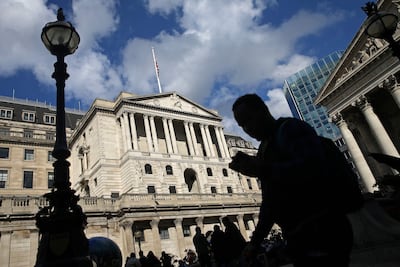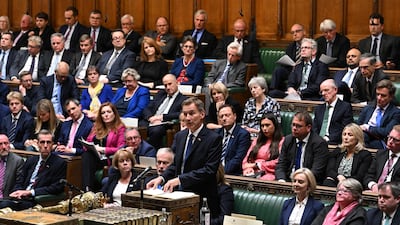Any government of a country that borrows from international markets will now know that its economic policies are judged in emphatic terms amid high inflation and slowing growth.
The UK’s attempt to prioritise populist measures triggered the equivalent of road rage from the bond market. The Bank of England stepped in to avoid catastrophe and Prime Minister Liz Truss’s government has reversed almost all her policies and pledged to cut public spending. On Thursday, she resigned, having never recovered politically from the turmoil.
While the bond market is actually a broad collection of government and corporate debt, this grouping has dictated our economic futures for decades. Investors want to be compensated for what they perceive as a higher risk and will vote with their feet to get it unless something is done to reduce this risk. Yields on 10-year US Treasuries - a lodestar for the pricing of global assets - are near a 14-year high. Bond yields rise when prices fall.
When the market rages against an issuer – as the UK experienced – like some kind of muscle-bound comic book villain, the result is a sell-off, which drives up the cost of borrowing. Usually this is enough to terrify a company or country into submission and curb any attempt to over-spend and over-borrow.
It has happened several times in recent history and has even kept US presidents in check. Bill Clinton famously had his wings clipped in the 1990s.
A little more than 14 years ago, when the financial crisis hit and lending was about to grind to a halt, central banks soothed the pain by buying up trillions of dollars of bonds to keep the gears moving.

But who is being best served by this subservience to bond markets?
Governments? Yes. In the medium to long term, keeping borrowing rates lower can save tens of billions of dollars. The banks? On many levels, as it suits them to let the bond market dictate the way of things. This is, at least, predictable and obeys the models that bankers build to ensure they can manage risk.
However, bond investors are not the same as households or families. They are typically big funds. While it is a sound argument that a collapse in bond prices hurts the value of pensions and mortgages – what happens when a majority of people no longer own their own home or look forward to retirement?
Today the bond market shouts loudest. Tomorrow its voice could be drowned out by an unprecedented scale of social disorder, following years of rising inequality.
Austerity policies across Europe over the past decade were borne by populations while trillions were spent – and printed – to support the financial system. The bond market was kept happy by this steady diet of quantitative easing. Only a narrow group, typically those already wealthy, benefited from the rising value of assets as wages remained suppressed and economic growth remained anaemic. There is no longer any appetite for a return to such a scenario.
According to the Atlantic Council, since 2008 major central banks have pumped more than $25 trillion into the economy through quantitative easing. Meanwhile, inflation is at levels not seen in 30 years and central banks are raising interest rates to stamp it out, even if it means forcing a recession.
People are dealing with a cost-of-living crisis and governments must respond – which will mean spending more or taxing less. The UK wanted to do both to stimulate growth and the market was highly sceptical it would work. The market won the argument.

Where does that leave governments? With very little wiggle room ahead of the expected economic downturn and with energy prices rising. They will be nervous about any plans to borrow and spend more.
This anxiety is not ideal. Investors must give policymakers more leeway to think more creatively about how to tackle our current conundrum or add to the volatility. The argument keeps being repeated that now is not the time for fiscal experiments, but when is the time if not now? When there is a desperate need for new thinking.
The truth is the world is a riskier place. Post-Covid-19 pandemic, we have seen the weaknesses in our supply chains and global trade systems. Climate change is affecting us all, wherever we live. There is political instability and a lack of trust in institutions across regions. Technological advances and changing societal norms are also at work.
We must adjust to this new reality as best we can and given all the complexities, we are struggling to be additionally compensated for this greater difficulty. Industrial action is becoming increasingly common as people demand pay increases and better working conditions.
Many in government and business around the world say that this is unrealistic and only adds to the feeling of crisis.
Should investors not also hold themselves to this standard too? It is time for a new paradigm for bond markets and one that considers the well-being of all.


